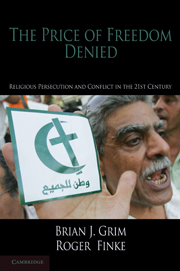Book contents
- Frontmatter
- Contents
- Preface:Religions' Shared Experience of Religious Persecution and Conflict
- 1 Religious Persecution
- 2 Religious Freedom
- 3 Persecution
- 4 Case Studies
- 5 A Closer Look
- 6 What about Muslim-Majority Countries?
- 7 Do Religious Freedoms Really Matter?
- Appendix Testing the Competing Arguments
- Bibliography
- Index
3 - Persecution
The Price of Freedom Denied
Published online by Cambridge University Press: 05 June 2012
- Frontmatter
- Contents
- Preface:Religions' Shared Experience of Religious Persecution and Conflict
- 1 Religious Persecution
- 2 Religious Freedom
- 3 Persecution
- 4 Case Studies
- 5 A Closer Look
- 6 What about Muslim-Majority Countries?
- 7 Do Religious Freedoms Really Matter?
- Appendix Testing the Competing Arguments
- Bibliography
- Index
Summary
Following the end of the Cold War, there was a remarkable silence about religious persecution. The atrocities of the Jewish Holocaust during World War II were well known, and Stalin's vicious attack on religion in the Soviet Union was common knowledge, but this all seemed safely distant from a world moving away from Communism. As the 1990s progressed, however, the silence was broken. The Bosnian war quickly revealed the savagery of which humans were still capable as the world witnessed thousands of Bosnian Muslims facing brutal persecution and being driven from their homes. Religion was only one of many elements in this “ethnic cleansing,” but in a growing number of instances, religion was at the core of physical persecution. As reviewed in Chapter 1, Michael Horowitz led an unlikely alliance in revealing religious persecution around the globe. But as the awareness of persecution became greater, explanations for the occurrence of violent religious persecution and conflict remained scarce.
Many of the most compelling and highly regarded explanations for conflict around the globe give scant attention to the role of religion. Moreover, religion is seldom included as a force in large cross-national studies of social conflict. Economic and political interests are typically treated as the powerful forces fueling the flames of dissent, with religion merely marking the boundaries for political alliances and economic concerns. Despite a mounting number of credible studies highlighting its significance, religion is seldom at the center of mainstream academic discussions on conflict.
- Type
- Chapter
- Information
- The Price of Freedom DeniedReligious Persecution and Conflict in the Twenty-First Century, pp. 61 - 87Publisher: Cambridge University PressPrint publication year: 2010

